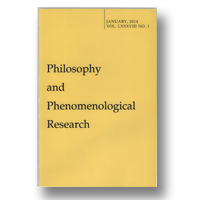|
|
|
1.
|
Philosophy and Phenomenological Research:
Volume >
88 >
Issue: 3
Nicholas Silins
The Agony of Defeat?
view |
rights & permissions
| cited by
|
|
|
|
|
|
|
2.
|
Philosophy and Phenomenological Research:
Volume >
88 >
Issue: 3
Samuel C. Rickless
The Contrast-Insensitivity of Knowledge Ascriptions
view |
rights & permissions
| cited by
|
|
|
|
|
|
|
3.
|
Philosophy and Phenomenological Research:
Volume >
88 >
Issue: 3
Todd Ganson, Ben Bronner, Alex Kerr
Burge's Defense of Perceptual Content
view |
rights & permissions
| cited by
|
|
|
|
|
|
|
4.
|
Philosophy and Phenomenological Research:
Volume >
88 >
Issue: 3
Stuart Brock
The Phenomenological Objection to Fictionalism
view |
rights & permissions
| cited by
|
|
|
|
|
|
|
5.
|
Philosophy and Phenomenological Research:
Volume >
88 >
Issue: 3
Tim Henning
Normative Reasons Contextualism
abstract |
view |
rights & permissions
| cited by
This article argues for the view that statements about normative reasons are context-sensitive. Specifically, they are sensitive to a contextual parameter specifying a relevant person's or group's body of information. The argument for normative reasons contextualism starts from the context-sensitivity of the normative "ought" and the further premise that reasons must be aligned with oughts. It is incoherent, I maintain, to suppose that someone normatively ought to φ but has most reason not to φ. So given that oughts depend on context, a parallel view about normative reasons is needed. It is shown that the resulting view solves notorious puzzles involving apparently conflicting but equally plausible claims about reasons. These puzzles arise especially in cases where agents have limited information or false beliefs. In these cases, we feel tom between reasons claims that take into account the limitations of the agent's perspective and apparently conflicting claims that are made from a more objective point of view. The contextualist account developed here accommodates both objectivist and subjectivist intuitions. It shows that all of the claims in question can be tme, provided that they are relativized to different values of the relevant information parameter. Also, contextualism yields a fmitful approach to the debate about having reasons and the alleged failure of the so-called "factoring account".
|
|
|
|
|
|
|
6.
|
Philosophy and Phenomenological Research:
Volume >
88 >
Issue: 3
Boyd Millar
The Phenomenological Problem of Perception
view |
rights & permissions
| cited by
|
|
|
|
|
|
|
7.
|
Philosophy and Phenomenological Research:
Volume >
88 >
Issue: 3
A. D. Smith
Spinoza, Gueroult, and Substance
view |
rights & permissions
| cited by
|
|
|
|
|
|
|
8.
|
Philosophy and Phenomenological Research:
Volume >
88 >
Issue: 3
Walter Ott
Malebranche and the Riddle of Sensation
view |
rights & permissions
| cited by
|
|
|
|
|
|
|
9.
|
Philosophy and Phenomenological Research:
Volume >
88 >
Issue: 3
Timothy Williamson
Précis of Modal Logic as Metaphysics
view |
rights & permissions
| cited by
|
|
|
|
|
|
|
10.
|
Philosophy and Phenomenological Research:
Volume >
88 >
Issue: 3
Phillip Bricker
The Methodology of Modal Logic as Metaphysics
view |
rights & permissions
| cited by
|
|
|
|
|
|
|
11.
|
Philosophy and Phenomenological Research:
Volume >
88 >
Issue: 3
John Divers
Modal Reality and (Modal) Logical Space
view |
rights & permissions
| cited by
|
|
|
|
|
|
|
12.
|
Philosophy and Phenomenological Research:
Volume >
88 >
Issue: 3
Meghan Sullivan
Modal Logic as Methodology
view |
rights & permissions
| cited by
|
|
|
|
|
|
|
13.
|
Philosophy and Phenomenological Research:
Volume >
88 >
Issue: 3
Timothy Williamson
Replies to Bricker, Divers, and Sullivan
abstract |
view |
rights & permissions
| cited by
The thoughtful and probing comments by Phillip Bricker, John Divers, and Meghan Sullivan on Modal Logic as Metaphysics raise a number of interlocking issues, both detailed ones about the reladon of my arguments to David Lewis's modal reahsm and more general ones about methodology in metaphysics. I will respond to each author separately, mentioning interconnections as they arise, and expanding some points made very briefly in the book.
|
|
|
|
|
|
|
14.
|
Philosophy and Phenomenological Research:
Volume >
88 >
Issue: 3
Recent Publications
view |
rights & permissions
| cited by
|
|
|
|




